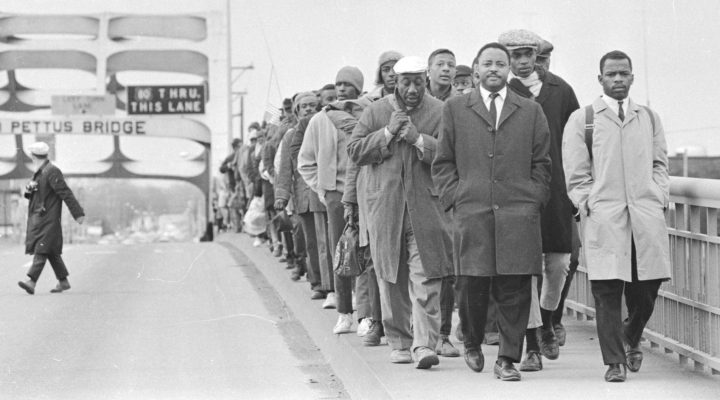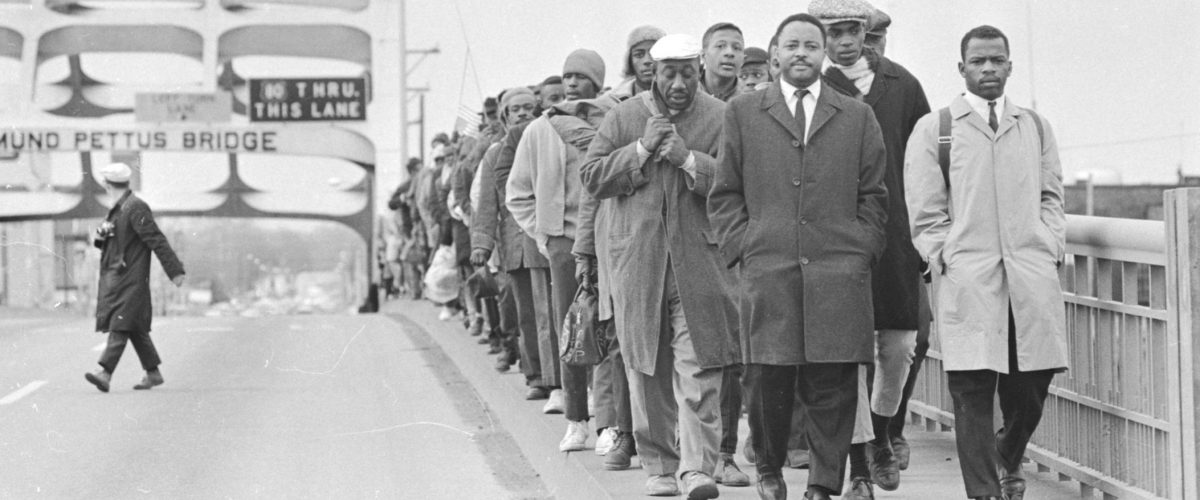Author David Greenberg knew he had a tough assignment ahead of him six years ago when he accepted the challenge of writing a biography of John Lewis.
The result is John Lewis: A Life, which draws on interviews with Lewis and 275 others who knew him at various stages of his life, as well as never-before-used FBI files and documents.
Lewis was born into poverty in rural Alabama and rose to become a U.S. Congressman from 1987 until his death in 2020. He was called by some the “conscience of Congress.”
 He first rose to national attention, however, for his work with Martin Luther King in the Civil Rights Movement. He was a Freedom Rider who helped integrate bus stations in the South, led the Nashville sit-in movement, was the youngest speaker at the 1963 March on Washington and served as chairman of the Student Nonviolent Coordinating Committee.
He first rose to national attention, however, for his work with Martin Luther King in the Civil Rights Movement. He was a Freedom Rider who helped integrate bus stations in the South, led the Nashville sit-in movement, was the youngest speaker at the 1963 March on Washington and served as chairman of the Student Nonviolent Coordinating Committee.
On Bloody Sunday in 1965, he was severely beaten by Alabama state troopers at the foot of the Edmund Pettus Bridge in Selma, Ala., and nearly died.
Although well-known for his life story, no biography of the Civil Rights icon had been published when Greenberg set out to write his.
“I first got the idea almost six years ago now when we were in the middle of a Trump presidency,” he explained. “I was looking for a new book project that would take me away from the chaos and negativity of the darkness of the Trump years. It occurred to me sort of in a Eureka moment that there was no biography of John Lewis. I was seeing him in the news a lot, which made me think I should set about trying to do justice to his incredible life.”
Greenberg knew, however, if he was going to make the project meaningful to the life and legacy of Lewis he was going to have to bring the legend to life.
“I think all of us have a schoolbook history of the Civil Rights Movement, but when you delve down into any of the individual lives of so many amazing men and women who fought for freedom and equality, you realize the richness and the complexity of the story,” he said.
Although Lewis is seen as a historical icon, Greenberg sought to bring him to life as a man who was seen by some as controversial.
“I made sure to share Lewis’ entire story from his start in the movement SNCC to him being in politics. I wanted to convey the sense he was a man making his way in the world, trying to do his best, but who confronted the kind of challenges and difficulties a lot of figures face, whether they’re challenging the system from the outside as he did in the sixties and seventies, or whether they’ve got their hands on some levers of power and are trying to fix things from the inside as he did in the eighties and nineties and after.
“These choices aren’t always easy,” the author continued. “John Lewis was a kind, thoughtful and dedicated agent of change who really tried to find the best way forward but didn’t always sit right with everybody else.”
Although Lewis was sometimes seen as complex and controversial, Greenberg sees Lewis as a man who rose above his adversaries. When Lewis enrolled in college at American Baptist Theological Seminary, some there thought he didn’t have what it took to become a minister. But Lewis would not abandon his calling.
“He’s raised in a very religious devout household, and his mother was especially devout,” Greenberg explained. “Yeah, Lewis becomes a boy minister and he loves reading the Bible and gets ordained at 16. He wants to follow in the footsteps of Dr. King, whom he’s already had the privilege of meeting and getting to know. Lewis wanted to take the Social Gospel teachings of King and apply those teachings to a just society and cultural to bring about an end to issues such as segregation.”
That very calling led Lewis to challenge the system. And it’s what placed him on the Edmund Pettus Bridge that fateful day.
“One of the most admirable things about John Lewis, and you see this as a thread throughout his career, is his willingness to take seriously and see the humanity in his adversaries, even those who almost beat him within an inch of his life,” Greenberg said. “Lewis was effused with a Christian Social Gospel teaching that he came to believe in that commanded him to find the better angels in himself and to treat these people as human beings.”
“One of the most admirable things about John Lewis, and you see this as a thread throughout his career, is his willingness to take seriously and see the humanity in his adversaries.”
Lewis’ calling into ministry wouldn’t take him to a church but to the halls of Congress.
Another unique feature of the new book is that Greenberg tells the story of Lillian Lewis, who married John Lewis and was his greatest encourager and motivator.
“Lillian’s story is pretty amazing, and it hasn’t been told until now,” he said. “I think my book will teach people a lot about her because she was someone who is deeply important to his career but really stayed behind the scenes. Lillian’s not in the press very much and she stayed behind in Atlanta while he was in Washington as a Congressman.”
Even though the book is nearly 700 pages, it could have been longer, the author said. “There’s something about John Lewis, his life, his example. It’s inspiring. It’s rich. It’s interesting.”
Greenberg is a professor of history and of journalism and media studies at Rutgers University and a frequent commentator on historical and political affairs. He is the author or editor of several books on American history and politics including Nixon’s Shadow: The History of an Image and Republic of Spin: An Inside History of the American Presidency.
Related article:
Remembering John Lewis: An invitation to make ‘good trouble’ | Analysis by Aidsand Wright-Riggins



